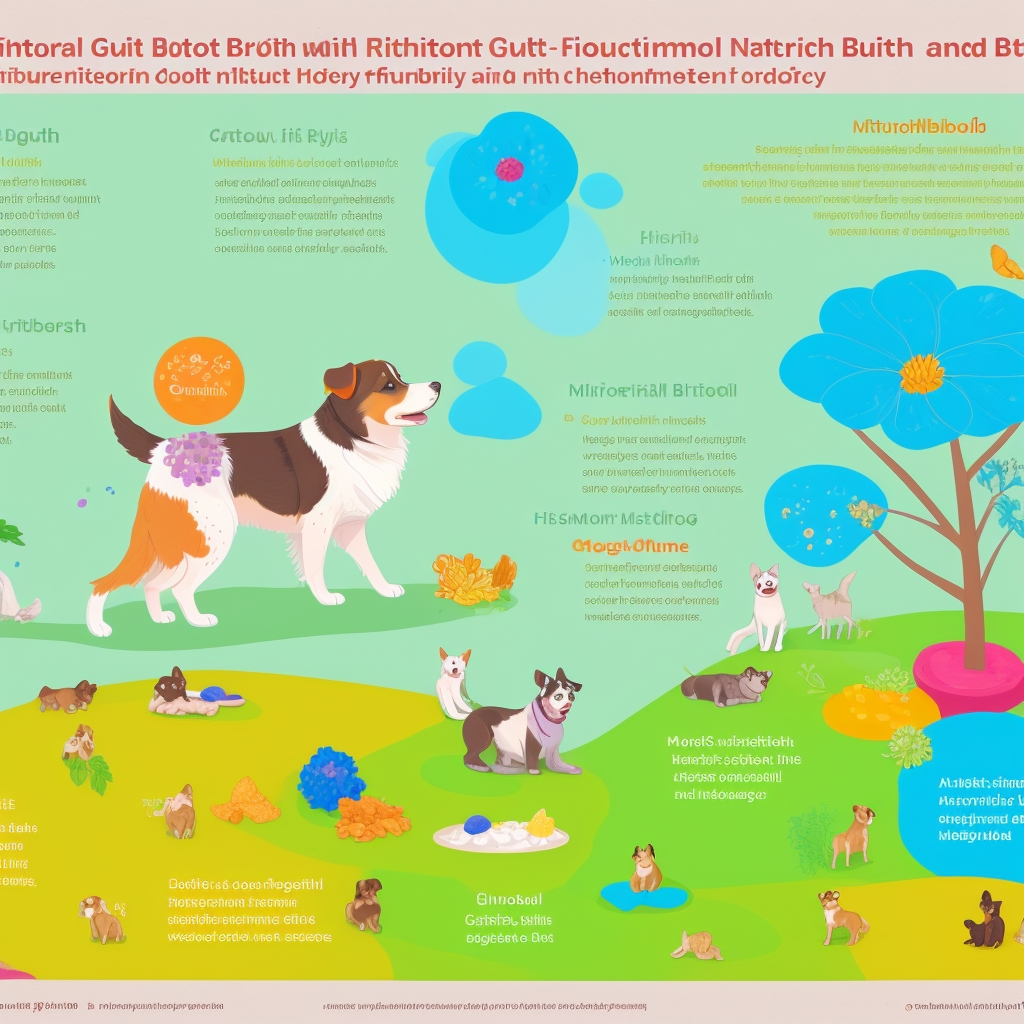12 Natural Allergy Relief Tips for Dogs: Focusing on Gut Health and Microbiome Balance
Hey there! If you’re diving into the world of natural remedies for your dog’s allergies, you’ve probably heard folks chatting about gut health and microbiome balance. But why is everyone so focused on these two elements? Well, it turns out they’re pretty key players when it comes to truly lasting allergy relief in dogs. After years in this field, I’ve picked up some handy tips that genuinely work. What’s interesting is how interconnected everything is, and once you start seeing the big picture, managing allergies becomes far less frustrating. The relationship between gut health and immune function is so profound that veterinary immunologists now consider the gut microbiome the “second brain” of immune response. Let’s dive in!
Tip 1: Start with the Basics – A Solid Dietary Foundation
Before you dive headfirst into advanced techniques, let’s establish one non-negotiable: your dog’s diet needs to be sound. A balanced, whole-food diet isn’t just good; it’s the cornerstone of robust gut health. Personally, I’ve found that diets rich in fiber, like those with pumpkin or sweet potato, can significantly help maintain a healthy digestive tract. These complex carbohydrates act as natural prebiotics, feeding beneficial bacteria while providing essential nutrients like beta-carotene and potassium.
Here’s the thing though: a staggering 70% of a dog’s immune system is housed in their gut, according to a compelling 2024 study published in the Journal of Veterinary Internal Medicine. This makes their daily diet not just important, but absolutely crucial for allergy management. The gut-associated lymphoid tissue (GALT) contains more immune cells than any other organ system, making dietary choices directly impact immune responses. When you consider that food allergies account for approximately 10-15% of all canine allergies, while environmental allergies make up the majority, optimizing gut health becomes even more critical for overall immune resilience.
Tip 2: Incorporate Probiotics for Gut Harmony
Probiotics, in my experience, are nothing short of transformative for your dog’s gut. They’re essentially beneficial bacteria that help balance the delicate ecosystem in their digestive system, directly supporting their immune response. I usually recommend a high-quality daily probiotic supplement – it’s always best to chat with your vet for tailored options. The most effective canine probiotics typically contain multiple strains, including Lactobacillus casei, Enterococcus faecium, and Bacillus coagulans, each serving different functions in digestive health.
What’s truly fascinating is that recent 2025 research from the American Veterinary Medical Association indicated dogs consistently on probiotics showed a remarkable 40% reduction in allergy symptoms over a 12-week period. That’s a statistic that speaks volumes! The study also revealed that dogs receiving multi-strain probiotics experienced fewer gastrointestinal upsets and showed improved coat quality, suggesting systemic benefits beyond allergy relief. The mechanism works through competitive exclusion, where beneficial bacteria crowd out harmful pathogens while producing short-chain fatty acids that strengthen the intestinal barrier.
Tip 3: Use Prebiotics for Added Benefit
Don’t forget about prebiotics! Think of them as the essential fuel for your probiotics, helping them thrive and colonize effectively. Foods like chicory root or dandelion greens are excellent natural sources, but you can also find Jerusalem artichoke, burdock root, and even green bananas as fantastic prebiotic options. I’ve consistently seen noticeable improvements in dogs’ allergy symptoms when prebiotics are a thoughtful, consistent part of their diet. It’s like building a super-highway for good gut bacteria.
The science behind prebiotics is particularly compelling – they’re non-digestible fibers that selectively stimulate the growth of beneficial bacteria. Inulin, found abundantly in chicory root, has been shown to increase Bifidobacterium populations by up to 300% within just two weeks of consistent supplementation. This creates a cascading effect where improved bacterial diversity leads to enhanced immune tolerance and reduced inflammatory responses.
Tip 4: Opt for Omega-3 Fatty Acids
I’ve always been a huge advocate for omega-3s because of their powerful anti-inflammatory properties. They can really help dial down the systemic inflammation often related to allergies. Quality fish oil is an excellent source, but always check the dosage with your vet to ensure you’re getting it just right – we don’t want any unintended consequences! The optimal ratio of omega-6 to omega-3 fatty acids should be approximately 4:1, though many commercial dog foods contain ratios as high as 20:1.
Beyond fish oil, consider alternative sources like algae-based omega-3 supplements, which are particularly beneficial for dogs with fish sensitivities. Flaxseed oil provides alpha-linolenic acid (ALA), though dogs convert this less efficiently to the more bioactive EPA and DHA forms. Recent studies have shown that dogs receiving therapeutic doses of omega-3s (approximately 20-55mg EPA per pound of body weight) experienced significant reductions in itching, skin redness, and inflammatory markers within 6-8 weeks.
Tip 5: Become an Allergen Detective
Identifying specific allergens is genuinely half the battle. This isn’t just about food; it could be environmental too. Regularly observing your dog’s reactions to new foods, treats, or even changes in their environment (like new cleaning products or seasonal pollens) can be incredibly enlightening. It requires a bit of patience, but the insights gained are invaluable. Keep a detailed allergy diary noting symptoms, timing, weather conditions, and any environmental changes.
The most common food allergens in dogs include beef, dairy, wheat, chicken, eggs, and soy, accounting for roughly 80% of food-related allergic reactions. However, environmental allergens like dust mites, mold spores, grass pollens, and flea saliva are far more prevalent triggers. Interestingly, dogs can develop allergies to proteins they’ve been exposed to repeatedly over time, which is why novel protein diets often provide relief. For more detailed guidance, I often point people towards comprehensive resources like the [Expert Guide: Spotting Canine Allergies in 2025].
Tip 6: Embrace Protein Rotation
Switching up the protein source in your dog’s diet isn’t just about variety; it can actively prevent the development of new sensitivities or allergies. I like to keep things fresh by rotating between different novel proteins like chicken, beef, and various fish, but also consider more exotic options like venison, duck, rabbit, or even insect-based proteins, which are becoming increasingly popular and sustainable.
Just remember, each change should be gradual – think a slow transition over several days to avoid any digestive upset. The ideal transition involves mixing 25% new protein with 75% current food for 2-3 days, then 50/50 for another 2-3 days, followed by 75% new and 25% old, before completing the switch. This methodical approach allows the gut microbiome to adapt while minimizing gastrointestinal stress. Protein rotation also helps maintain dietary interest and can prevent the immune system from becoming overly sensitized to any single protein source.
Tip 7: Keep Stress Levels Low
This might surprise some, but stress can absolutely wreak havoc on your dog’s delicate microbiome. I’ve found that a combination of regular, appropriate exercise and a consistent daily routine can significantly help maintain their gut health. Plus, spending quality, calm time together can work wonders for both your stress levels – it’s a win-win! Chronic stress elevates cortisol levels, which directly suppresses immune function and disrupts the gut-brain axis.
Consider incorporating calming activities like puzzle toys, gentle massage, or even canine meditation techniques. Dogs are incredibly sensitive to their owner’s emotional state, so managing your own stress levels can have a profound impact on your pet’s well-being. Environmental enrichment, such as rotating toys, providing safe spaces, and maintaining predictable routines, can significantly reduce anxiety-related immune suppression. Studies have shown that dogs in high-stress environments have measurably different gut bacterial compositions compared to their calmer counterparts.
Tip 8: Explore Thoughtful Herbal Remedies
Certain herbs, like chamomile and echinacea, can offer wonderful support for immune function and help soothe irritating allergy symptoms. However, it’s crucial to approach this thoughtfully. I always recommend consulting a holistic vet to find the right herbs and dosages for your pup’s unique needs. They can guide you past the guesswork to truly effective solutions.
Other beneficial herbs include nettle leaf, which acts as a natural antihistamine, and turmeric, renowned for its potent anti-inflammatory properties due to its active compound curcumin. Quercetin, often called “nature’s Benadryl,” can be found in apples and berries and helps stabilize mast cells that release histamine. Milk thistle supports liver detoxification, which is crucial for processing allergens and inflammatory compounds. Always introduce herbs gradually and monitor for any adverse reactions, as some dogs may be sensitive to certain botanical compounds.
Tip 9: Understand Antibiotic Impact
While undeniably necessary at times, antibiotics can be quite disruptive to the gut microbiome. If your dog does need a course of antibiotics, it’s incredibly important to follow up with a robust probiotic regimen to help restore that crucial bacterial balance. The disruption can persist for weeks or even months after antibiotic treatment ends, making proactive restoration essential.
Consider spacing probiotics at least 2-3 hours away from antibiotic doses to prevent the medication from killing the beneficial bacteria you’re trying to introduce. Some veterinarians recommend starting probiotics during antibiotic treatment and continuing for 2-4 weeks afterward. Fermented foods like kefir or fermented vegetables can also help rebuild microbial diversity naturally. This critical balance is discussed in detail in resources like the [2025 Canine Allergy Trends: Natural Remedy Impact].
Tip 10: Prioritize Hydration
It might sound too simple, but proper hydration is fundamental for maintaining a healthy digestive system. I always ensure my dog has constant access to plenty of fresh, clean water. Adding a bit of bone broth can make water much more enticing for picky drinkers and provides beneficial additional nutrients like collagen, glycine, and minerals that support gut lining integrity.
Dehydration can concentrate allergens and toxins in the system while impairing the body’s natural detoxification processes. The mucus lining of the intestinal tract requires adequate hydration to function as an effective barrier against allergens and pathogens. Consider adding water to dry kibble or incorporating moisture-rich foods like cucumber or watermelon (in moderation) to boost overall fluid intake. Some dogs prefer moving water, so fountain-style bowls can encourage increased consumption.
Tip 11: Schedule Regular Vet Check-Ups
Regular check-ups aren’t just for vaccinations; they’re crucial for catching potential issues early and monitoring overall health. Your vet is your best partner in crime when it comes to monitoring your dog’s gut health and providing tailored, professional advice. They might even suggest [Advanced Dog Allergy Testing: When to Consider in 2025] if they suspect deeper issues.
During these visits, discuss any changes in appetite, bowel movements, energy levels, or skin condition, as these can all indicate shifts in gut health and immune function. Your veterinarian can perform fecal examinations to check for parasites or bacterial imbalances, and may recommend specialized testing like food elimination trials or intradermal allergy testing for persistent cases. Blood work can reveal inflammatory markers and nutritional deficiencies that might be contributing to allergy symptoms.
Tip 12: Commit to Continuous Learning
The field of canine health is always evolving, with new research emerging constantly. Staying informed through reputable resources, like the comprehensive [2025’s Canine Allergy Trends: Natural Remedies Impact], can truly help you stay ahead of the curve and consistently provide the absolute best care for your beloved furry friend. It’s a journey, not a destination!
Recent breakthroughs in veterinary medicine include personalized nutrition based on genetic testing, advanced microbiome analysis, and innovative immunotherapy treatments. The understanding of epigenetics – how environmental factors influence gene expression – is revolutionizing how we approach allergy management. Emerging research on the mycobiome (fungal microorganisms) and virome (viral components) of the gut ecosystem is revealing new therapeutic targets for immune modulation.
Frequently Asked Questions
Question 1: Why is gut health so crucial for allergy relief in dogs?
Gut health is paramount because, as we’ve discussed, a significant 70% of a dog’s immune system is located right there in their gut. A balanced microbiome can dramatically reduce inflammation and improve immune responses, leading to fewer and less severe allergy symptoms. The gut microbiome produces metabolites like short-chain fatty acids that directly influence immune cell development and function.
The intestinal barrier, often called the “leaky gut” when compromised, normally prevents allergens from entering systemic circulation. When this barrier is healthy and intact, supported by beneficial bacteria and proper nutrition, it can significantly reduce allergic reactions. The gut also houses specialized immune cells called regulatory T-cells that help maintain immune tolerance and prevent overreactions to harmless substances. For those looking for a deep dive into diagnosing allergies, the [Essential Allergy Diagnosis for Dogs’ Natural Care 2025] offers excellent insights.
Question 2: Can diet alone manage my dog’s allergies?
While diet is absolutely foundational and a powerful tool, it’s often part of a broader, more holistic approach. Combining a meticulously balanced diet with targeted probiotics, effective stress management, and consistent regular vet visits can significantly enhance your dog’s allergy management and overall well-being. It’s about building a comprehensive strategy that addresses multiple factors simultaneously.
Diet can be particularly effective for food allergies, with elimination diets showing success rates of 80-90% when properly implemented. However, environmental allergies typically require additional interventions like environmental control, topical treatments, and sometimes immunotherapy. The synergistic effect of combining dietary management with other natural approaches often produces better results than any single intervention alone.
Question 3: How quickly can I expect to see improvements?
This is a common and understandable question! Improvements can vary quite a bit from one dog to another. Some dogs show promising signs of relief in just a few weeks, while others may take a few months to respond fully. Consistency, patience, and diligent observation are key. Any adjustments to their diet and routine should be monitored over a sustained period.
Generally, gut microbiome changes can begin within days of dietary modifications, but clinical improvements in allergy symptoms typically take 4-8 weeks to become apparent. Skin healing and coat improvement may take even longer, as the skin cell turnover cycle is approximately 21-28 days in dogs. Severe cases or dogs with multiple sensitivities may require 3-6 months of consistent management before significant improvement is observed.
Question 4: Are there specific probiotics recommended for dogs?
Yes, absolutely! Several probiotics are specifically formulated for canine use, often containing strains like Lactobacillus acidophilus, Bifidobacterium animalis, Enterococcus faecium, and Bacillus coagulans. However, given the individuality of each dog, it’s always best to consult your veterinarian to find the best match for your dog’s specific needs and health profile.
Look for products with guaranteed potency through expiration date, multiple strain diversity, and third-party testing for purity. Some beneficial strains specifically researched in dogs include Lactobacillus rhamnosus for immune support and Bifidobacterium longum for intestinal health. Spore-forming probiotics like Bacillus subtilis are particularly stable and can survive stomach acid better than vegetative forms. They can guide you to a truly effective product that matches your dog’s specific health requirements and lifestyle factors.
To wrap up, if I had to pick one top recommendation – the single most impactful step you can take – it would be to consistently incorporate high-quality probiotics into your dog’s daily diet. They offer a plethora of benefits for gut health and, by extension, allergy relief. Remember, every dog is wonderfully unique, so it might take a bit of trial and error to truly find what works best for your furry family member. Don’t get discouraged; the journey to comfort is worth it, and the bond you’ll strengthen through this process of careful observation and care will benefit both of you immensely. Happy experimenting, and here’s to a happier, less itchy pup!
Tags: #DogAllergies #GutHealth #NaturalRemedies #MicrobiomeBalance #CanineCare







